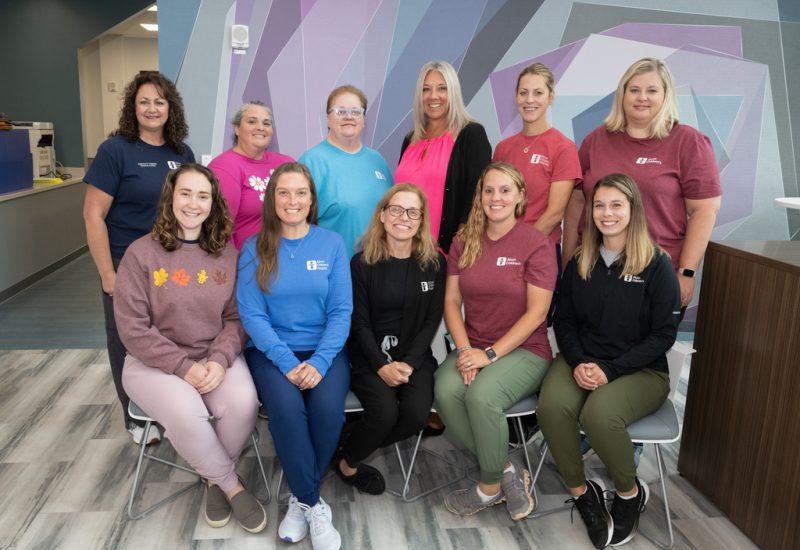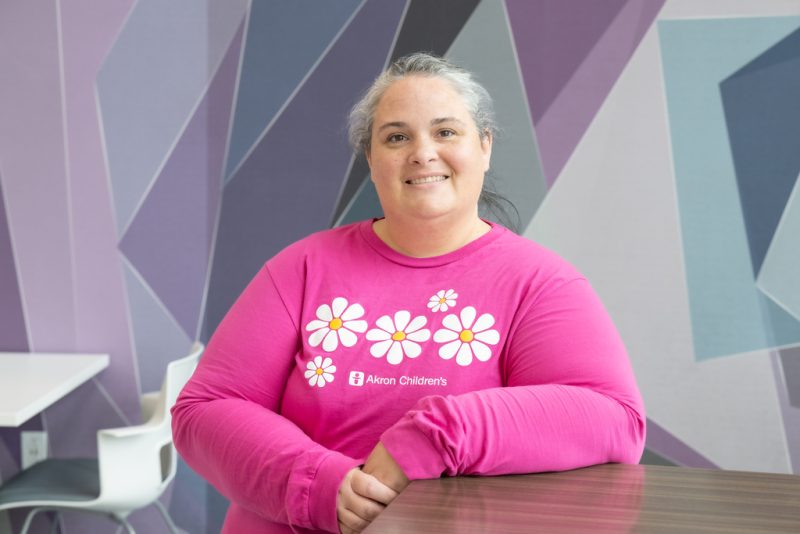
In addition to Hilary, the clinical research nursing team includes Heather Anthony, Jessica Kracker, Ashley Erdesky, Jo Ann Katz, Josselyn Coppenger, Kelly Norton, Lauren Croisant, Michelle Parrish, Nicole Twinem, Shelby Wenger and Kelly Culp (not pictured).
Hilary Tonni’s days as a clinical research nurse at Akron Children’s are as dynamic as they are unpredictable.
“No two days are the same,” she said.
Her work can shift from managing patient visits and addressing urgent issues to diving into data entry and study management, making each day uniquely challenging and rewarding. Her journey into research nursing began in 2011.
“I wanted to learn more about pharmaceutical companies and the process for getting medications developed,” she said. “I also still wanted a patient care role, which this allows me to have, all while learning how these new medications affect our patients.”
Despite their focus on clinical trials, clinical research nurses are vital in the patient care coordination aspect of clinical drug and device trials for patients who frequently visit the hospital.
“We help ensure patients are scheduled in an appropriate timeframe with all the appropriate ancillary departments that might be needed to conduct a research visit,” Hilary said. “We also make sure necessary clinical tasks like vitals, EKGs, IVs and bloodwork are completed.
“Typically, we’re the main individuals our patients see and talk to throughout their time in research,” she added. “Our families and patients develop a trust in us.”

Hilary Tonni
For Hilary, the most rewarding part of her job is seeing the tangible outcomes of her work—whether it’s a patient improving or hearing about a medication she helped approve on a TV commercial. However, the job isn’t without its challenges.
One of the hardest aspects is when a clinical trial is shut down, especially for patients who may have no other treatment options.
“There are many reasons why a sponsor company may close a study down,” Hilary said. “It may be because the drug isn’t safe, or the study didn’t meet its endpoints.
“The hardest part of my job comes with knowing that sometimes a clinical trial didn’t succeed,” she added. “The most difficult calls to make are when you have to tell a family the treatment they are receiving needs to be immediately stopped because the study is shutting down.”
Maintaining data accuracy and integrity is crucial in clinical trials, and Hilary says teamwork plays a big role.
“We have external monitors from the sponsoring companies and internal compliance auditors who help ensure everything is correct,” she said. “This collaborative approach helps maintain the integrity of the data, which is essential for the success of the studies.”
At Akron Children’s, the scope of clinical trials spans multiple departments including PICU, Neurology, Pulmonary, Endocrinology, Hematology/Oncology and more. These trials encompass medication studies, device studies and data collection studies, offering a wide range of opportunities for research nurses to make a difference.
Hilary’s role in clinical research has evolved significantly since she started. Reflecting on her experience, she advises those considering a career in clinical research to be prepared for a steep learning curve.
“Research nursing is nothing like inpatient bedside nursing,” she said, encouraging new nurses to give themselves grace as they adapt to this unique and challenging field. “While some of the tasks may be familiar, we work with a lot of unknowns – unknown drugs, unknown side effects, unknown efficacy and unknown benefits. It just becomes a different way of working and thinking.”
Ultimately, what Hilary finds most fulfilling about her work is the impact she has on the medical community.
“Seeing the difference we’re making by helping to get new treatments approved for patients so they can live longer, more meaningful lives is incredibly rewarding,” she said.
Learn more about nursing careers at Akron Children’s and the Rebecca D. Considine Research Institute and current clinical trials and studies.










